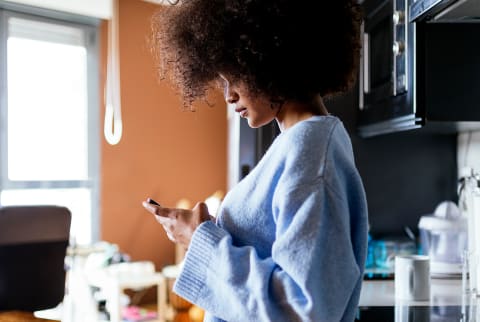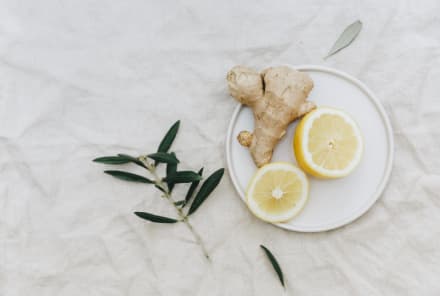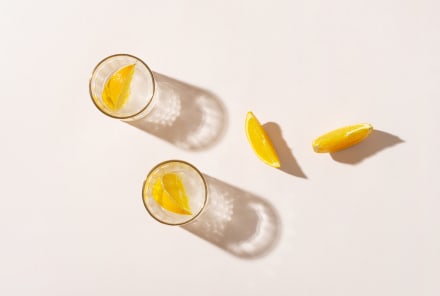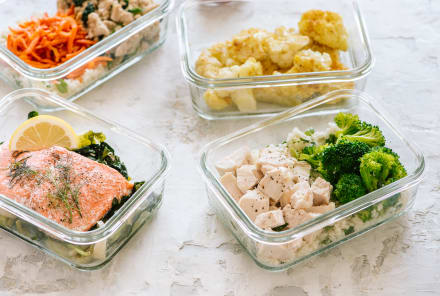Advertisement
I Asked ChatGPT To Make My Meal Plan For The Week: Here's What Happened


ChatGPT, the chatbot developed by OpenAI celebrated its first anniversary on November 30, 2023. As a certified holistic nutritionist, I've been hearing rumblings from peers that this one-year-old is eventually going to make us obsolete.
Curiosity got the better of me, and I wanted to see just how well ChatGPT could put together a dietitian-approved meal plan that meets my family's dietary needs, restrictions, and taste preferences.
Here are the prompts I used to generate a meal plan, my top takeaways from the process as a nutritionist, and what dietitians have to say.
What is ChatGPT, and how do you use it?
If you're not familiar with ChatGPT, it's an advanced computer program that uses artificial intelligence to talk to like a virtual friend. To use it, you type or speak your questions or thoughts (prompts), and it will respond in a conversational way. It's trained to understand and generate humanlike text, which is why people use it for things like getting help with homework, brainstorming ideas, practicing languages, or just having casual conversations.
The prompt I used to get started
Can you please help me create a meal plan for this upcoming week? The meal plan needs to feed 2 active adults and a toddler. We don't need any special toddler food. The toddler will eat the same food as us. The adults eat bigger portions than average.
Please give me 3 meals and 2 snacks per day. Meals should include at least 25 grams of protein, a good serving of carbohydrates, 1-2 cups of veggies and some healthy fats.
Snacks should combine at least 20 grams of protein with a carbohydrate.
I'd like you to use ingredients we already have in our fridge/freezer/pantry to build this meal plan, but we can also shop for a few new things.
What else do you need to know?
Once I entered my initial prompt, ChatGPT asked me to provide a list of the ingredients from my fridge, freezer, and pantry and to specify dietary preferences, restrictions, and cuisines we prefer. Once ChatGPT had all that information, it started generating a five-day meal plan for me.
The meal plan
After much back-and-forth with ChatGPT, here is the final five-day meal plan it generated for my family.
| Day | Breakfast | Lunch | Dinner | Snack 1 | Snack 2 | |
|---|---|---|---|---|---|---|
| 1 | Scrambled eggs with diced veggies and whole grain toast or English muffin with avocado slices (for Husband) + Smoothie for You | Grilled Chicken and Vegetable Wrap | Italian Turkey and Veggie Skillet | Trail Mix | Nut Butter Apple Slices | |
| 2 | Turkey Breakfast Sausages and Sweet Potato Hash | Bison and Vegetable Stir-Fry | Mexican Stuffed Bell Peppers | Hummus with Veggie Sticks | Whole Grain Crackers with Nut Butter | |
| 3 | Scrambled eggs with diced veggies and Whole grain toast or English muffin (for Husband) + Peameal Bacon and Avocado Toast for You | Turkey and Vegetable Stir-Fry | Turkey and Sweet Potato Skillet | Apple Slices with Nut Butter | Trail Mix | |
| 4 | Avocado Toast with Peameal Bacon for You + Overnight Chia Seed Pudding with almond milk topped with sliced bananas and a sprinkle of hemp hearts (for Husband) | Turkey and Vegetable Stir-Fry | Chicken Sausage and Sweet Potato Bake | Granola Bar + Fruit | Protein-Packed Energy Bites | |
| 5 | Apple Pie Oatmeal | Greek-Inspired Orzo Bowl | Chicken Sausage and Sweet Potato Bake | Granola Bar + Fruit | Protein-Packed Energy Bites |
What I learned in the process
It’s more time-consuming to use ChatGPT
As someone who loves to cook and is comfortable in the kitchen, meal planning doesn't require much thought or time. I spend maybe 10 to 15 minutes thinking about our meal plan before grocery shopping and cooking. By the time I finished the back-and-forth conversation with ChatGPT to make adjustments, I had spent 90 minutes on a meal plan I still wasn't too impressed with.
You need an understanding of nutrition for best results
The first iteration of meals and snacks ChatGPT suggested were too low in protein and carbohydrates. Even though I told ChatGPT that my husband and I are active and eat larger portions than average, it kept suggesting rice cakes for snacks and smoothie bowls for breakfast that contained very little protein.
"From a performance nutrition standpoint, I think ChatGPT lacks an understanding of protein requirements outside of meals for those with high levels of physical activity. The "protein-packed" energy bites contain filling ingredients but ones that likely do not offer enough protein for athletes and those with high activity levels," explains performance dietitian and consultant Kelly Jones, M.S., R.D., CSSD. "While nuts, nut butters, and seeds may be adequate for the average, more sedentary person, those with very active jobs and who engage in rigorous physical activity multiple days a week may benefit from not only more total protein but more quality protein in terms of essential amino acid content."
I was able to prompt ChatGPT to make adjustments because of my background as a certified holistic nutritionist. The average person might not be able to recognize these red flags.
"For a registered dietitian, 'smoothie' may mean a nutrient-packed meal that is adequate in energy, but to the average person with less nutrition knowledge, just indicating 'smoothie' as a meal may result in a fruit and almond-milk-only option that leaves the individual hungry soon after," adds Jones.
Meal suggestions are lacking diversity
As someone who loves to eat flavorful food and even gave ChatGPT a few cuisines I enjoy, I was disappointed by how boring and Americanized the suggested meals and snacks were. For example, I told ChatGPT that I like Greek and Mexican cuisines, and it suggested making a Greek chicken salad and Mexican stuffed peppers with black beans and salsa.
"Undoubtedly, more cultural diversity is needed regarding the recommended options AI provides," says Briana Butler, MCN, RDN, L.D., co-owner of Stef and Bri Wellness. "While the meal plan developed may be based on the foods you have available, it is clear that the technology, without more intricate direction, will assume that the person asking for the plan prefers a Westernized or Eurocentric diet."
Butler adds that the lack of resources available for AI to pull from to develop inclusive nutrition options is a nod to why utilizing diverse practitioners to support research, recipe, and consumer-facing educational resource development is so important.
ChatGPT makes a lot of mistakes
Despite telling ChatGPT what foods to avoid due to allergies, it kept including them in the meal plan. I found myself giving the same prompts over and over again. Once the meal plan was finalized and I asked ChatGPT to generate a grocery list based on the plan, it left off a number of items.
ChatGPT can't provide personalization
ChatGPT might be useful for generating a meal plan template, but every time I asked it to hit a specific macro target, it told me that calorie counts are approximate and I would need to adjust portion sizes based on my specific dietary needs. Again, not something the average person will know how to do without a background in nutrition.
"The approximate portions would be helpful, especially for the protein and carbohydrate amount, to make sure you're both meeting your needs based on how active you are that day," says registered dietitian and sports nutritionist Rachel Hannah, R.D. "The longer we work out for and the higher the intensity, the more carbohydrates our body needs that day, so these targets would be useful in this plan. I often give approximate carb and protein targets for athletes to make sure they are meeting their needs on more active days."
ChatGPT might be better for generating recipe ideas
In the past, I've given ChatGPT a list of three to five ingredients in my pantry and asked it to generate a few recipe ideas using those ingredients. I found that worked better than trying to get a five-day meal plan created with a long list of ingredients available.
I might have had better luck asking ChatGPT to give me dinner ideas only and then using leftovers for the next day's lunch.
The takeaway
I asked ChatGPT to come up with a well-rounded, high-protein meal plan for my family to put the AI platform's nutrition knowledge to the test. Turns out, it doesn't hold a candle to IRL nutritionists.
Overall, it was a frustrating experience that involved constantly having to remind ChatGPT about our dietary preferences and allergies, and I wasn't impressed with the final meal plan. Lesson learned: Nutrition is inherently personal—and inherently human.











